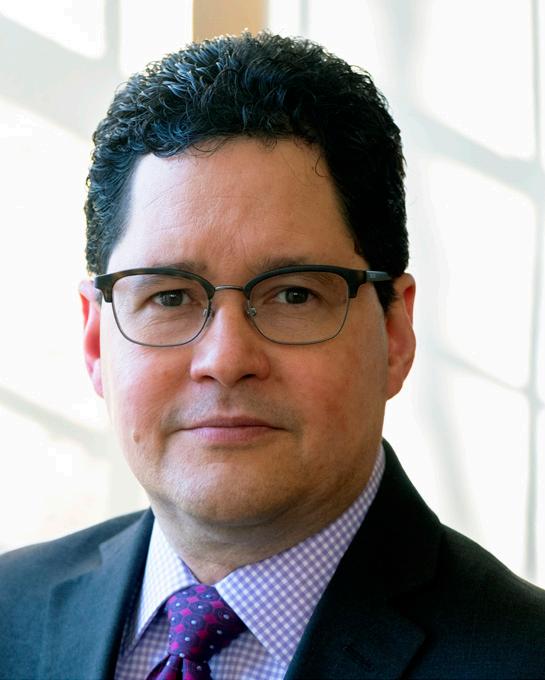
4 minute read
Presidential Perspective with Javier A. Viera
At a recent regional gathering of friends and supporters of the seminary, a layperson wasted no time in asking me some poignant questions: “What are you teaching them to do? What is your value proposition?” His questions were grounded in the assumption that “people just aren’t coming back to church after the pandemic. We’re at about 60% of our pre-pandemic attendance, and we were already struggling before the pandemic hit. I’m not sure we’ll be around in five years, at least not in the same way.”
The church has faced challenges before, even challenges of greater scale and impact than COVID-19. I’m not worried that faithful and vibrant expressions of Christian faith and practice will emerge post-pandemic. What I am certain of, and this is, in part, what I told my new friend, is that these new expressions won’t look like what I assumed he meant by the pre-pandemic church.
His questions, “What are you teaching them to do? What is your value proposition?” have stayed with me, and as we celebrate another graduating class from GarrettEvangelical, they seem like good ones to ponder more deeply; although, I might prefer them in less corporatespeak. What are we sending these recent graduates into the world to do? How are we preparing them to meet the uncertainties, challenges, and disappointments/ disillusionments that most surely await them? You’ll see from their profiles on pages eight through 13 the variety of creative ministries they are pursuing and creating and the passion with which they long to serve God and neighbor. They give me great hope for the future of Christian witness in the world. Yet, it does feel like in the time between their arrivals and departures much has substantially and permanently changed. How have they been prepared for that change? This is how I would answer the poignant questions I was asked:
I hope we’ve prepared them to lead in a Christ-like manner and spirit. The gospel presents Jesus as someone deeply connected to the realities, joys, sufferings, and longings of his people. Incarnation and Resurrection are the bookends of his life and ministry. I hope that our graduates have been prepared to lead incarnationally— present to, in, and with the realities of the people and communities they serve and always proclaiming in word and deed the good news of resurrection—the new life that God has promised, even amid despair. Jesus led with empathy and hope and always reminded those with him of God’s real and enduring presence.
I hope we’ve prepared them to lead with a vibrant, passionate spirituality and confidence in God’s justice and goodness. My prayer is that our graduates are Spirit-filled people, deeply and personally connected to the Source of their vocation and calling, theologically grounded and inspired, and moved by the Spirit of God to lead, act, proclaim, and care boldly about the well-being of God’s people and God’s earth. If they follow the Spirit’s lead, this will send them on adventures of a lifetime, that will put them on the frontlines of the struggles for justice and peace in our world, that will lead them to confront powers and principalities, and that will lay on them the responsibility of helping communities to grow by imagining creative expressions of faithful witness and hope in the world. This manner of leadership and spiritual engagement will require Spirit-filled imagination and courage that is only sustained by a vibrant connection and groundedness in the Spirit.
I hope we’ve prepared them to lead with confident humility. Nurtured by regular participation in the sacramental life, I pray their identity is primarily shaped by their baptismal covenant and their place at the eucharistic table, which means first and foremost that they and all are beloved, welcomed, and accepted as children of God. If they start from this “social location,” they can only lead in the same manner—receiving all as God’s beloved, working to build and strengthen communities that do as well, and struggling mightily against all barriers to that end. When we see the face of God in the other and accept our own futures as intimately tied to their flourishing, it shapes how we lead and how we understand the ends leadership serves.
How do we know what we’re training people for? What is our value proposition? Of course, the above is less an exhaustive list than it is a beginning. I hope we’ve prepared our 2021 graduates to be Christlike adventurers, inspired by and connected to the movement of the Spirit, who are confidently and humbly able to creatively improvise and effectively translate the justice, love, and mercy of God into lived reality, for themselves and for the people and communities God has called them to love and serve. That is a value proposition that is priceless.






